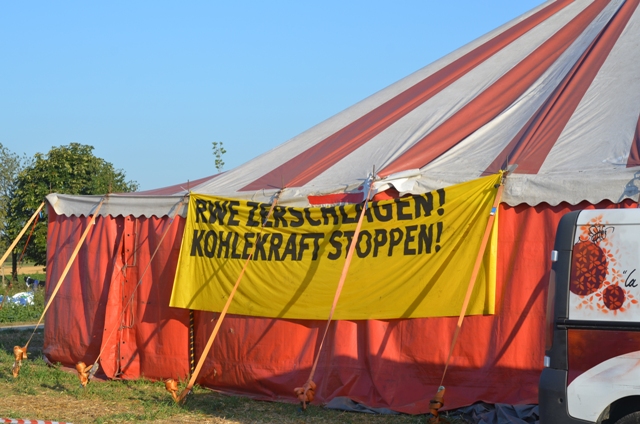By Maja Göpel
Before an individual chooses to act, he or she requires a story or mindset to make sense of what the situation is about. Acting rationally in this sense means to act with reason, in congruence with one’s worldview and the individual interpretation of the “rules of the game.” Individual mindsets, however, are not fixed when we are born, but the result of learning and socialization processes in which the collective imaginary and narratives about life, society and desirable futures provide the reference framework.
So what happens if this reference framework becomes unconvincing or even unbelievable - as it seems to be the case with the narrative of continuous economic growth? It causes a lot of confusion, mistrust, politicization, fear and – opportunity for change.
The latter is what the postgrowth, de-growth and beyond GDP movement is aiming at, as well as big sections of the emerging sustainability transformation research community and groups calling for strong sustainability. I want to highlight that the overarching stories and rationales for change, as well as the values, principles and rules for its realization, are very aligned. What we see emerging qualifies for a paradigm shift cutting across theory and practice which is a high leverage point for system transformations.
The term “paradigm shift” originates from the philosophy of science and usually references Thomas Kuhn as the original thinker in this context. In scientific terms, paradigms comprise assumptions that are epistemological (what we can know), ontological (what can be said to exist and how we group it) and methodological (which guideline framework for solving a problem is suitable). In the context of worldviews, many add axiological aspects (which values are adopted). Depending on how these are defined, one and the same event will be interpreted very differently. Kuhn also observed that usually several paradigms exist, but only one seems to become dominant – as it was the case with mainstream economics over the last 200 years.
The socio-economic concept of path dependencies sheds some light on the underlying reasons: if the status quo is challenged, it translates into a deviation from the “normal” way of doing things which creates higher transaction costs, (presumably) higher risks and a fear of losing roles, identities and privileges. On top of this, standardized procedures, legal institutionalization and the creation of material-economic infrastructures lead to further lock-ins that take a lot of political will to change.
This plethora of self-stabilizing path dependencies in our minds and institutions is what Antonio Gramsci captured in his concept of hegemony. Next to the more visible exertion of power in form of money, jurisdiction or other types of coercion, it is the widely established convictions and canonized knowledge, cultural narratives, belief-systems and the “derived needs” in a given society that play out in favor of those benefiting from the status quo. [1] These allow for “leadership with least resistance”, if supported by a programmatic “social myth” which provides the imagination and justifications as to why this particular set of values, norms, practices, institutions and regulations is of general interest. The idea of endless economic growth benefiting all may have been the most powerful example for such a social myth.
Its perseverance has been the biggest roadblock for getting the sustainable development agenda on track. The Rio Declaration of the United Nations made sustainable development the overarching policy principle of international cooperation. According to its official definition it means development that “meets the needs of the present without compromising the ability of future generations to meet their own needs” while giving priority to the needs of the poor and acknowledging the limitations that social and technological activities impose on nature’s ability to replenish means.[2] Economic, social and environmental concerns were to be integrated.
What happened instead was that environmental and social aspects were fitted into the economic growth story and its underlying paradigm- which tells us nothing meaningful about human needs and keeps us blind to natural reproduction cycles. Needs are reduced to the general concept of “utility maximization” and, based on the ontological assumption that humans are selfish, insatiable and rational, it is concluded that this goal is best serviced by ever increasing consumption. Equipped with so-defined “representative actors”, markets in which everything of value will find a price and is subject to supply and demand, are considered the most efficient and just institutions for progress. Consequently, it is assumed that wealth accumulation on the top will trickle down to the poor as long as they offer anything valuable.
According to this rationale of universal monetarization, the need to assess nature’s ability to replenish resources became unnecessary. The concept of “capital substitutability” crept into our development story which means that loss of nature can be compensated by other capital or input factors created by humans. As a consequence, the myth of economic growth became shielded against the attack of “limits to growth” reports and co-opted into the hegemonic regime, as Antonio Gramsci would say.
The world now had 20 years to observe the empirical consequences of these mathematical stunts, and the call for a paradigm shift or (great) transformations has become standard in the discourse around the post2015 development agenda, the emerging Sustainable Development Goals or the new IPCC assessment report: a renewed opportunity for deep structural change.
System transformation researchers like those at the Nesta Foundation in the UK brought forward a list of five “main ingredients” for successful transformation:A core element in this sequence is the “new approach” mentioned in point 3. Just as paradigms and hegemonic mindsets have a hampering effect on alternative proposals, the challenging of these paradigms and their crisis equally holds the emancipatory power for system transformations.
While many argue that, with regard to the development story of economic growth, such alternatives are still dispersed happenings and nowhere near providing a consistent approach, I think we are at a tipping point. A first superficial review of a few movements shows a lot of commonalities between the core principles of, for example, the “Economy for the Common Good“[4], the “Transition Town movement”[5], and the Commoning movement[6], or the international efforts to measure a new development paradigm led by Bhutan with its Gross National Happiness approach[7] .
Cross-cutting ideas and rationales juxtaposed to the mainstream economic ones are:Shedding old paradigms and imaginaries of life, society and desirable futures usually goes alongside crises in the “real” world. We are looking at a rocky ride ahead, but the more clarity we have about where we want to get and how it can be done, the better we can coordinate.
This leaves me to finish with Milton Friedman: “Only a crisis-actual or perceived-produces real change. When that crisis occurs, the actions that are taken depend on the ideas that are lying around. That, I believe, is our basic function: to develop alternatives to existing policies, to keep them alive and available until the politically impossible becomes the politically inevitable.”
> Comment this article on the German blog "Postwachstum"
COVID-19 is both one and the same as any other ecological crisis (such as climate change) because its emergence is rooted in the same mode of production that has generated all other ecological crises and social inequalities of our times. In late 2019, a novel coronavirus (SARS CoV-2) emerged from a wet market in Wuhan in the province of Hubei in China. It has so far resulted in cases ov...

On March 15th 2019 a global climate strike organized by Fridays for Future took place in over 100 countries around the world, mobilizing over 1 million students to the streets. We asked 3 people from Vienna involved in different streams of the Austrian climate justice movement to share their perspectives on the event. 1) Organization and planning of the Strike by Colleen Schneider In Janu...

For our Degrowth in Action - Climate Justice Summer School 2015 we are currently looking for contributors to our courses. The summer school will take place from 9 to 14 August 2015 in the lignite-mining region of the Rhineland in cooperation with the annual climate camp. The courses will be at the centre of the Summer School and run for 4 or 2 days, thus giving the opportunity to dive deeper in...